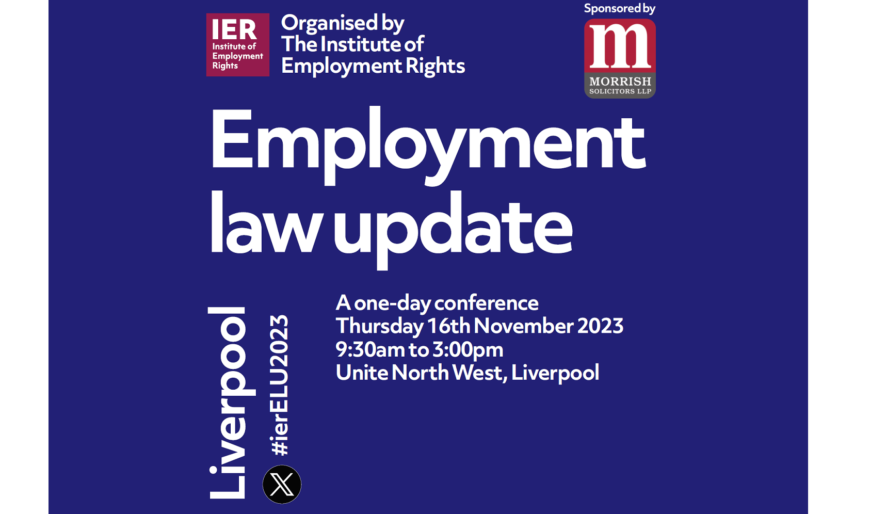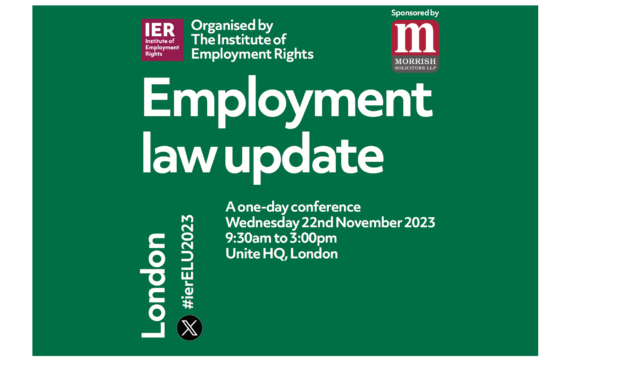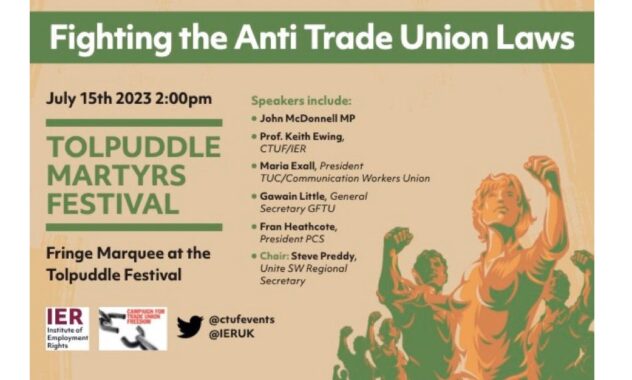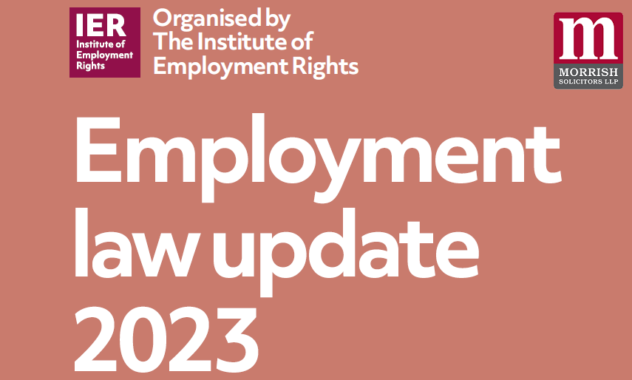Employment law update November 2023 (Liverpool)
Our highly popular annual update on statute, case law and employment rights

Event blog
by Charlie Wilson, Wirral Met College

It was good to be back at an IER Employment Law Update, the first time I had been to an update from the Institute since just before the Covid pandemic, and it was good to see some familiar faces.
Opening the event, IER Deputy Director James Harrison noted the International Labour Organisation’s rebuke to the UK government over the P&O Ferries sacking of 800 workers, the increasing abuse of human rights by our government and, in a theme carried through the day, the threat posed by Strikes (Minimum Service Levels) Act (MSL). James reported that Labour intended to remove the legislation in its first 100 days if/when they win the next election: we will see how that turns out.
Bernie Wentworth of Thompsons Solicitors updated us on holiday pay, including the implications of the recent case of Chief Constable of the Police Service of Northern Ireland v Agnew and others, which established that employers could not lawfully avoid paying holiday pay at the average rate of pay even if there was a gap of three months between a series of underpayments.
Penny Rimmer from Greater Manchester Poverty Action spoke passionately on getting public bodies to adopt the socio-economic duty (SED) originally drafted – but not enacted – under the Equality Act 2010, in order to tackle the huge damage that poverty does to communities. Participants were keen to understand how they could get their workplace or authority on board with the SED.
After the break, Dr Riccardo Buendia-Esteban from the University of Manchester addressed the false international comparisons that had been made in the media and by politicians with laws in Italy, France and Spain to justify the MSL Act – not least in omitting those countries’ protection of the right to strike. Ricardo also talked in depth about the similarities and differences between the new UK Act and the development of oppressive labour law in Chile – and how even the law-makers in Chile didn’t go quite as far as the UK government.
The excellent Paul Scholey from event sponsors Morrish Solicitors updated us on developments in discrimination law, including the latest on the Forstater case, in which the claimant had been awarded £105,000 for loss of earnings and earnings capacity, aggravated damages and injury to feelings for discrimination over her gender-critical beliefs.
That appeal ruling had established that such beliefs were “worthy of respect in a democratic society” and protected under the Equality Act 2010, and subsequent cases had confirmed that “Forstater is here to stay”.
Paul also highlighted that the Worker Protection (Amendment of Equality Act 2010) Act had introduced a duty on employers to protect against sexual harassment went through particular cases of note around the likes of religion and belief and harassment, but had stopped short of extending the duty to the actions of third parties.
After lunch Professor Keith Ewing from King’s College London spoke on fair-pay agreements and the historical role of a Ministry of Labour. Keith stressed the importance of holding Labour to its New Deal for Working People, including sector-wide collective bargaining and bringing UK law into compliance with international law. But with Labour changing policy ideas like the wind changes direction, would these still be a priority?
In the final session, Liz McKean from War on Want spoke passionately on how the Public Order Act and the Economic Activities of Public Bodies (Overseas Matters) Bill were calculated attacks on the democratic rights to protest and boycott, examples of increasingly authoritarian laws from the current government.
Keith Ewing detailed how the MSL Act effectively ended the right to strike by giving employers in six key sectors the right to order individuals and their unions to break their own strikes, and how it was imperative that it be repealed.
Download event documents
- Bernie-Wentworth-Holiday-Pay-16.11.2023.pdf - 230.20 KB
- Penny-Rimmer-SED-16-Nov-23.pdf - 227.03 KB
- Ricardo-Buendia-False-MSL-comparisons-06.11.23.pdf - 107.98 KB
- Paul-Scholey-Discrimination-update-16.11.23.pdf - 654.94 KB









